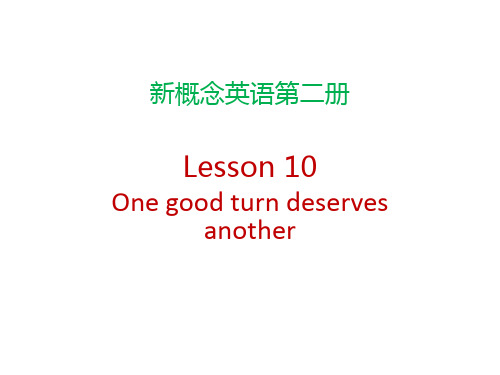新概念英语第二册第11课
- 格式:doc
- 大小:71.00 KB
- 文档页数:10

新概念英语第二册11课答案【篇一:新概念英语第二册第11课】ves another 礼尚往来i was having dinner at a restaurant when tony steele came in. tony worked in a lawyers office years ago, but he is now working at a bank. he gets a good salary, but he alwaysborrows money from his friends and never pays it back. tony saw me and came and sat at the same table. he has never borrowed money from me. while he was eating, i asked him to lend me twenty pounds. to my surprise, he gave me the money immediately. i have never borrowed any money from you, tony said, so now you can pay for my dinner!new words and expressions 生词和短语turn n. 行为,举止 deserve v. 应得到,值得 lawyer n. 律师bankn. 银行 salary n. 工资 immediately adv. 立刻 tony [?t?uni]参考译文我正在一家饭馆吃饭,托尼.斯蒂尔走了进来。
托尼曾在一家律师事务所工作,而现在正在一家银行上班。
他的薪水很高,但他却总是向朋友借钱,并且从来不还。
托尼看见了我,就走过来和我坐到一张桌子前。
他从未向我借过钱。
当他吃饭时,我提出向他借20英镑。
令我惊奇的是,他立刻把钱给了我。

新概念英语第二册第11课:One good turn deserves anotLesson 11 One good turn deserves another礼尚往来First listen and then answer the question.听录音,然后回答以下问题。
Who paid for Tony's dinner?I was having dinner at a restaurant when Tony Steele came in.我正在一家饭馆吃饭,托尼.斯蒂尔走了进来。
Tony worked in a lawyer's office years ago, but he is now working at a bank.托尼曾在一家律师事务所工作,而现在正在一家银行上班He gets a good salary, but he always borrows money from his friends and never pays it back.他的薪水很高,但他却总是向朋友借钱,并且从来不还Tony saw me and came and sat at the same table. He has never borrowed money from me.托尼看见了我,就走过来和我坐到一张桌子前。
他从未向我借过钱While he was eating, I asked him to lend me &20. To my surprise, he gave me the money immediately.但他吃饭时,我提出向他借20英镑。
令我惊奇的是,他立刻把钱给了我'I have never borrowed any money from you,' Tony said,'so now you can pay for my dinner!'“我还未向你借过钱。


Lesson 6I have just moved to a house in Bridge Street. Yesterday a beggar knocked at my door. He asked me for a meal and a glass of beer. In return for this, the beggar stood on his head and sang songs.I gave him a meal. He ate the food and drank the beer. Then he put a piece of cheese in his pocket and went away. Later a neighbour told me about him. Everybody knows him. His name is Percy Buttons. He calls atevery house in the street once a month and always asks for a meal and a glass of beer.New words and expressions 生词和短语beggar ['beg ?] n.乞丐food [fu:d] n.食物pocket ['p?kit] n.衣服口袋call [k?:l] v.拜访,光顾Lesson 7The plane was late and detectives were waiting at the airport all morning. They were expecting a valuable parcel of diamonds from South Africa. A few hoursearlier, someone had told the police that thieves would try to steal the diamonds. When the plane arrived, some of the detectives were waiting inside the mainbuilding while others were waiting on the airfield. Two men took the parcel off the plane and carried it into the Customs House. While two detectives were keeping guard at the door, two others opened the parcel. To their surprise, the precious parcel was full of stones and sand!New words and expressions 生词和短语detective [di'tektiv] n.侦探airport ['e?p?:t] n.机场expect [ik'spekt] v.期待,等待valuable ['v? lju ?b?l, -jub ?l] a.贵重的parcel ['p a :sl] n.包裹diamond ['dai ?m?nd] n.钻石steal [sti:l] v.偷main [mein] a.主要的airfield ['e ?fi:ld] n. 飞机起落的场地guard [g Q :d] n.警戒,守卫precious ['pre ??s] a.珍贵的stone [st ?un] n.石子sand [s?nd] n. 沙子Notes on the text 课文注释1detectives were waiting at the airport all morning, 侦探们在机场等了整整一上午。


逐句精讲新概念英语第二册:第十一课礼尚往来Lesson 11 One good turn deserves another课文内容:I was having dinner at a restaurant when Harry Steele came in. Harry worked in a lawyer's office years ago, but he is now working at a bank. He gets a good salary, but he always borrows money from his friends and never pays it back. Harry saw me and came and sat at the same table. He has never borrowed money from me. While he was eating, I asked him to lend me &2. To my surprise, he gave me the money immediately.'I have never borrowed any money from you,' Harrysaid,'so now you can pay for my dinner!'本文语法:动词+sb.(宾语)+to do(宾补)语法归纳:宾补用来补充说明宾语的动作或状态。
常见的这类动词有:ask 要求;tell告诉;order命令;expect期待;teach教;train训练;prefer宁愿;wish希望;want想要;allow允许;advise建议逐句精讲:1.I was having dinner at a restaurant when Harry Steele came in.我正在一家饭馆里吃饭,这是托尼.斯蒂尔走了进来。
新概念英语第二册lesson11-lesson15最全课后答案详解新概念英语第二册lesson11-lesson15最全课后答案详解Lesson 11摘要写作:one good turn deserves anotherI was having dinner at a restaurant. I saw Tony Steele after a while. He always borrows money fromh is friends. Tony sat at my table. I asked him to lend me twenty pounds. He gave me the money at once. He wanted me to pay for his dinner. 49word s Key to KS Exercises Aa he is now workingb he gets ; he always borrows ; never pays i t backc came in…worked; Tony saw ; came and sat ; I asked him ; he gave me ;Tony saidd He has never borrowed ; I have never borrowed e I was having ; he was eating C1 gets…got2 have not had3 was w riting…talked/were talking4 am typing5 passed/were passingDThe Taj Mahal was built…after he became/had become ruler,his wife…died.The Taj Mahal was built in her honour. Experts were called in…The Taj Mahal, which was begun in 1632 and (was) completed in 1654, cost a fortune…it has been visited by…Key to SD Exercises a A1 The officer ordered the men to fire at the enemy.2 He wants his wife to wear this dr ess.3 She wants us to explain it.4 I cannot allow him to enter the room.B (sample sentences)1 He asked me to help him.2 We preferred her to stay at home.3 He taught me to speak English.4 My mother wished me to collect the laundry.5 Do you want her to visit youb1 salary2 lent…salary/wages3 borrowed4 wag es5 wagesLesson 11多项选择1. b根据课文第6-7行I asked him to lend me twenty pounds… he gave me the money immediately, 应该选b. 而其他3个选择都不符合课文内容。
新概念英语第二册lesson11-lesson15最全课后答案详解Lesson 11摘要写作:one good turn deserves anotherI was having dinner at a restaurant. I saw Tony Steele after a while. He always borrows money fromh is friends. Tony sat at my table. I asked him to lend me twenty pounds. He gave me the money at once. He wanted me to pay for his dinner. 49word sKey to KS Exercises Aa he is now workingb he gets ; he always borrows ; never pays i t backc came in…worked; Tony saw ; came and sat ; I asked him ; he gave me ;Tony saidd He has never borrowed ; I have never borrowed e I was having ; he was eating C1 gets…got2 have not had3 was w riting…talked/were talking4 am typing5 passed/were passingDThe Taj Mahal was built…after he became/had become ruler,his wife…died.The Taj Mahal was built in her honour. Experts were called in…The Taj Mahal, which was begun in 1632 and (was) completed in 1654, cost a fortune…it has been visited by…Key to SD Exercises a A1 The officer ordered the men to fire at the enemy.2 He wants his wife to wear this dr ess.3 She wants us to explain it.4 I cannot allow him to enter the room.B (sample sentences)1 He asked me to help him.2 We preferred her to stay at home.3 He taught me to speak English.4 My mother wished me to collect the laundry.5 Do you want her to visit youb1 salary2 lent…salary/wages3 borrowed4 wag es5 wagesLesson 11多项选择1. b根据课文第6-7行I asked him to lend me twenty pounds… he gave me the money immediately, 应该选b. 而其他3个选择都不符合课文内容。
Lesson 11 One good turn deserves another 礼尚往来1: I was having dinner at a restaurant when Harry Steele came in. Harry worked in a lawyer's office years ago, but he is now working at a bank.1) 过去进行时:1>概念:表示在过去某一时刻或某一段时间内进行或发生的动作。
其形式为:was /were + V-ing。
常与表示过去的时间状语连用,如:last night, last Saturday等;或者与when, while, as引导的过去时间状语连用。
2>基本用法<1>. 过去进行时的基本用法主要表示过去某一时间正在进行的动作。
如:He fell asleep when he was reading. 他看书时睡着了。
<2>. 用过去进行时表示现在主要是为了使语气委婉、客气。
如:I was wondering if you could give me a lift. 我不知你能否让我搭一下车。
【注】一般过去时也有类似用法,但比较而言,用过去进行时显得更客气,更不肯定。
<3>. 过去进行时表示感情色彩与现在进行时相似,过去进行时也可表示满意、称赞、惊讶、厌恶等感情色彩,也通常与always, forever, continually等副词连用。
如:They were always quarrelling. 他们老是吵架。
<4>. 动词be的过去进行时动词be的进行时也可表示过去一时的表现或暂时的状态。
比较:He was friendly. 他很友好。
(指过去长期如此)He was being friendly. 他当时显得很友好。
(指当时一时的表现)补充:when 的后面加一般过去时,而且动词是非延续性动词。
Lesson 11 One good turn deserves another 礼尚往来I was having dinner at a restaurant when Tony Steele came in. Tony worked in a lawyer's office years ago, but he is now working at a bank. He gets a good salary, but he always borrows money from his friends and never pays it back. Tony saw me and came and sat at the same table. He has never borrowed money from me. While he was eating, I asked him to lend me twenty pounds. To my surprise, he gave me the money immediately. 'I have never borrowed any money from you,' Tony said, 'so now you can pay for my dinner!'New words and expressions 生词和短语turn n. 行为,举止deserve v. 应得到,值得lawyer n. 律师bank n. 银行salary n. 工资immediately adv. 立刻Tony [ˈtəuni]参考译文我正在一家饭馆吃饭,托尼.斯蒂尔走了进来。
托尼曾在一家律师事务所工作,而现在正在一家银行上班。
他的薪水很高,但他却总是向朋友借钱,并且从来不还。
托尼看见了我,就走过来和我坐到一桌子前。
他从未向我借过钱。
当他吃饭时,我提出向他借20英镑。
令我惊奇的是,他立刻把钱给了我。
“我还从未向你借过钱,”托尼说道,“所以现在你可以替我付饭钱了!”good turn deserves another 礼尚往来~这是句谚语,意思是对于别人的善意或帮助应作出相应的回报。
1) 名词turn的含义之一是“(帮助或损害他人的)举动”、“行为”:. 乔治昨天做了一件对我有利/不利的事。
Yesterday George did me a good/an ill turn.他总是乐于为他人做好事。
He is always ready to do a turn for others.turn n. / v.n. [c]1. an act of turning sb./sth. around 转动;旋动. 转动几下把手。
Give the handle a few turns.、2. a change in direction in a vehicle(车辆的)转弯;转向. 向左/右拐入西大街。
Make a left/right turn into West street.3. a bend or corner in a road (道路的)弯道;拐弯处. 弯弯曲曲的小巷a lane full of twists and turns(lane [lein] n. 1. (乡间)小路2. (尤用于地名)小巷;胡同;里弄(long)3.车道4.(比赛的)跑道;泳道5.航道;航线twist [twist] n. 1.[c] 急转弯处;曲折处2. [c]转动;旋转;搓;捻;拧;扭动3. [c] (故事或情况的)转折,转变,突然变化v. 1. vt. 使弯曲,使扭曲(成一定形状)2. (使)弯曲变形,扭曲变形 3. 扭转;转动(身体部位)) 4.[c] the time when sb. in a group of people should or is allowed to do sth. (依次轮到的)机会, 顺次. 轮到你时,再抓一牌。
When it’s your turn, take another card.下次该轮到我开车了。
It’s my turn to drive next.IDM:1) in turn(1) one after the other in a particular order依次;轮流;逐个. 孩子们逐一自报。
The children called out their names in turn.(2) as a result of sth in a series of events相应地;转而. 增加生产会继而增加利润。
Increased production will, in turn, lead to increased profits. (lead to sth 导致;造成后果)—2) take turns(in sth./to do sth)(BrE also take it in turns) 依次;轮流. 雄鸟和雌鸟轮流伏窝。
The male and female birds take turns in sitting on the eggs.我们轮流做家务。
We take it in turns to do the housework.5. an unusual or unexpected change in what is happening (异乎寻常或意外的)变化,转变. 在以后的几周里,事态急转直下。
Events took a dramatic turn in the weeks that followed. 6.[c] 行为;举止做有利于/有损于某人的事do sb. a good/bad turn. 昨天乔治做了一件对我有利的事。
Yesterday George did me a good turn.IDM:&1) (do sb.) a good turn (to do) sth. that helps sb. (为某人做)好事,善事;(做)有助于某人的事. 好啦,这就是我今天做的好事。
Well, that’s my good turn for the day.2) one good turn deserves another(saying)you should help sb. who has helped you 善须善报;要以德报德;好人应得好报7. [the+S (of)]时间上的转折点;交替时期IDM. the turn of the century/year the time when a new century /year starts 世纪之交;新年伊始;辞旧迎新之际. 这是在世纪之交修建的。
It was built at the turn of the century.IDM: at every turn everywhere or every time you try and do sth处处;事事;每次. 我事事都不顺心。
At every turn I met with disappointment.v..1. to move or make sth. move around a central point (使)转动;旋转. vi. 汽车的轮子开始转动起来。
The wheels of the car began to turn.vt. 他转动钥匙开锁。
He turned the key in the lock.2. [usually+adv./prep.] to move your body or part of your body so as to face or start moving in a different direction 转身;扭转(身体部位). vi. 我们转身朝家走去。
We turned and headed for home.vt. 他转身背对着墙。
He turned his back to the wall.3. [vn.+adv./prep.] to move sth. so that it is in a different position or facing a different direction.翻转;翻动;把…翻过来. vt. 她把椅子翻转过来修理。
She turned the chair on its side to repair it.'4. (使)改变方向;转弯. vi. 他拐进了一条狭窄的街道。
He turned into a narrow street.vt. 那男人转过街角就没影了。
The man turned the corner and disappeared.5. vi. (潮汐)to start to come in or go out开始涨(或落). 涨潮了,我们最好回去吧。
The tide is turning-we’d better get back.(tide [taid] n. 1.[c, u] 潮,潮汐2.[c] 潮流;趋势;动向)6. 翻,翻动(书页). vt. 他坐在那里无所事事地翻着书。
He sat turning the pages idly.)(idly [ˈaɪdlɪ] adv. 懒惰地;无所事事地,闲着adj. idle ['aidl] adj. 空闲的, 闲着的;懒散的, 无所事事的)vi. 反到第23页。
Turn to page 23.7. to change into a particular state or condition; to make sth do this (使)变成;成为. 天气变得寒冷多风。
The weather has turned cold and windy.秋天树叶变黄。
In autumn the leaves turn brown.8. (vi. + adv./prep.; vt.+ object+adv./prep.)(使)转变(形态、性质等)(尤与from; into连用). 经过50年,这个地方从一个小村庄变成了大城镇。
In fifty years, this place has turned from a little village into a large town.(女巫把王子变成了青蛙。
The witch turned the prince into a frog.(wizard [ˈwizəd] n. 男巫;术士;神汉)9.[v-n] (not used in the progressive tenses 不用于进行时) to reach or pass a particular age or time 到达,超过(某一年龄或时间). 他到六月份就满21岁了。